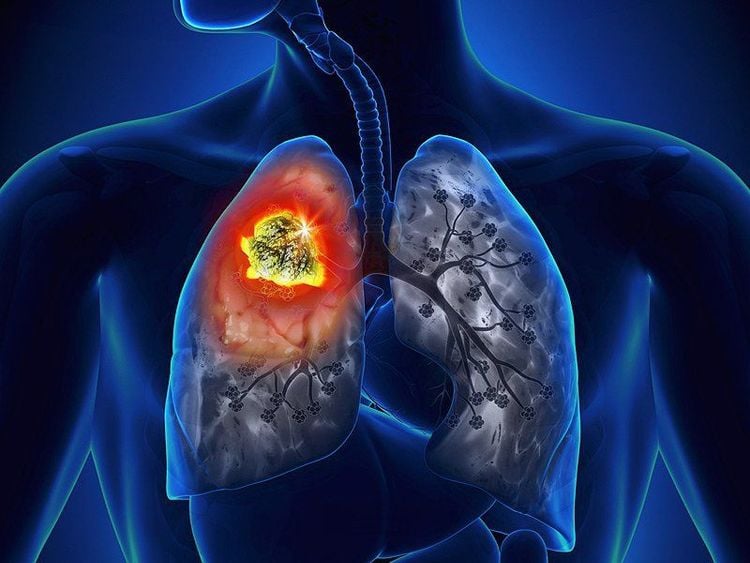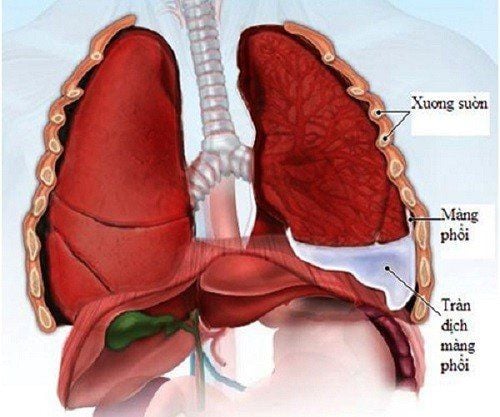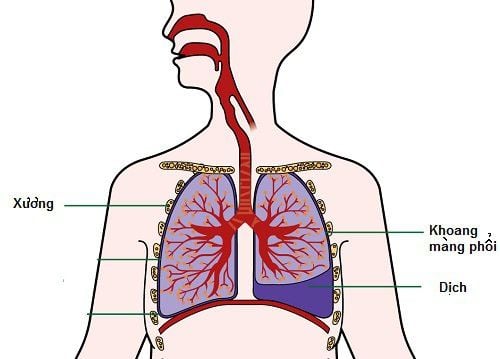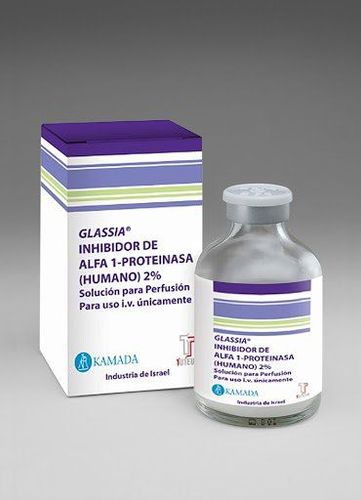This is an automatically translated article.
Lung cancer is a common cancer and causes high mortality in Vietnam. Signs of the disease are often not apparent until metastatic lung cancer is diagnosed. Therefore, the treatment of metastatic lung cancer requires a combination of therapies such as immunotherapy, chemotherapy, and radiation therapy to be highly effective.
1. Metastatic lung cancer
Metastatic lung cancer occurs when lung cancer cells break away from the tumor and travel to other parts of the body through the blood or lymphatic system.
Lung cancer can metastasize at the time of diagnosis or after treatment. Because the symptoms when lung cancer appear, there are no obvious signs, so lung cancer often metastasizes before being diagnosed.
The most common sites for metastatic lung cancer are the lungs, adrenal glands, bones, brain, and liver.
Metastatic lung cancer is not the same as recurrent lung cancer. Recurrent lung cancer is cancer that comes back in the same place where lung cancer was treated instead of going to other parts of the body. If cancer develops in a lung that was previously affected, it is more likely to be a new metastatic cancer, not a recurrent cancer. In all cases, a metastatic tumor is always caused by cancer cells moving from another part of the body.

Trong điều trị ung thư phổi di căn, cần kết hợp nhiều liệu pháp để đem lại hiệu quả điều trị cao
2. Treatment of metastatic lung cancer
If you have metastatic lung cancer, your doctor may start with methods such as: Chemotherapy; targeted therapy or immunotherapy. Your doctor will choose a therapy that can shrink the tumor or eliminate the metastases. However, if that treatment doesn't work as expected, your doctor may try one or more complementary therapies at the same time or later to get the best results.
The Food and Drug Administration (FDA) has approved several immunotherapy drugs for metastatic lung cancer for use before or after chemotherapy. Clinical trials are conducted to test how well these drugs work in combination with chemotherapy and radiation.
2.1. Targeted treatment
These treatments can be used alone or with chemotherapy to treat metastatic lung cancer:
Afatinib (Gilotrif), dacomitinib (Vizimpro), erlotinib (Tarceva), gefitinib (Iressa), necitumumab (Portrazza) and osimertinib (Tagrisso) both target a lung cancer cell protein called EGFR. They work if additional chemotherapy treatment is needed.
Bevacizumab (Avastin) and ramucirumab (Cyramza) are used with chemotherapy. They stop tumor growth by cutting off food - nutrients, blood and oxygen are essential ingredients for tumor growth.
Alectinib (Alecensa), brigatinib (Alunbrig), ceritinib (Zykadia), crizotinib (Xalkori) are used for cancers with a gene rearrangement called ALK.
2.2. Checkpoint inhibition
There are four immunotherapy drugs approved by the Food and Drug Administration (FDA) to treat certain types of non-small cell lung cancer. These substances are called checkpoint inhibitors. This is a drug that restarts the immune system so it can recognize and fight cancer cells. As a result, the tumor will be narrow and slow to grow.
2.3. Immunotherapy with chemotherapy
Chemotherapy is a standard treatment for metastatic lung cancer. Different types of chemotherapy may be used alone or in combination.
Several studies have shown that using a combination of chemotherapy and immunotherapy as a first-line attack against metastatic small cells (NSCLCs) is a good approach. It helps the immune system find and destroy cancer cells.

Hóa trị là phương pháp được sử dụng phổ biến trong điều trị ung thư phổi di căn
2.4. Immunotherapy with irradiation
Currently, radiation is used mainly to relieve symptoms of metastatic lung cancer. Some doctors think that treating lung tumors with radiation will first induce an immune response and help immunotherapy drugs find and destroy cancer cells. However, more research is still needed to find out which tumors respond best to this treatment and how often the dose should be administered.2.5. Immune drugs
Doctors are also testing immunotherapy drugs for metastatic lung cancer that are approved to treat malignancies. One of these drugs, ipilimumab (Yervoy), is being tested in combination with nivolumab to see if they work better together than with chemotherapy.
The goal of treatment is to limit tumor growth and stop the spread of metastatic lung cancer. If chemotherapy can't do this, your doctor will have to try other methods. Or can also offer patients to sign up for clinical trials to find the optimal method. Sometimes, chemotherapy can do more harm, in which case the doctor may turn to supportive care, treating symptoms caused by metastatic lung cancer.
To minimize lung cancer, you should perform lung cancer screening as soon as possible when you see abnormal signs. This will help early detection and timely treatment to avoid unfortunate things happening.
Please dial HOTLINE for more information or register for an appointment HERE. Download MyVinmec app to make appointments faster and to manage your bookings easily.
Article referenced source: Webmd.com












